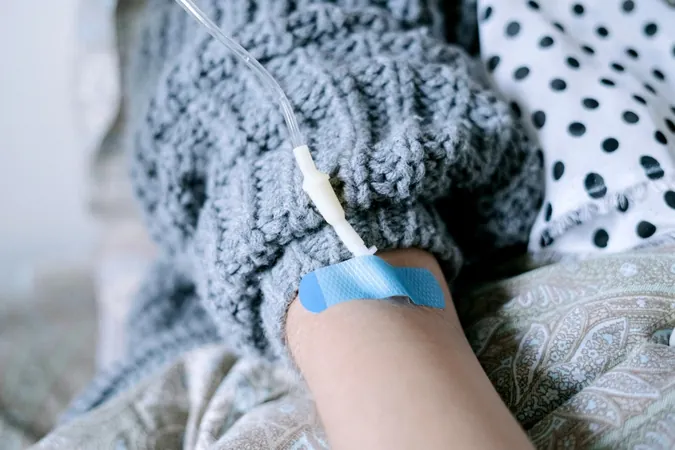
HRT Declared First-Line Treatment for Menopause Symptoms by NICE: Major Shift Amid Controversy
2024-11-07
Author: William
Introduction
In a groundbreaking announcement, the National Institute for Health and Care Excellence (NICE) has recommended that hormone replacement therapy (HRT) be offered as the primary treatment option for women experiencing menopause symptoms. This decision, released in their latest guidelines for medical professionals in England and Wales, marks a significant change from previous recommendations.
New Guidelines Focus on HRT
The newly published guidelines assert that HRT is the preferred method for alleviating distressing symptoms such as hot flushes, night sweats, depression, and sleep disturbances, quelling worries that cognitive behavioral therapy (CBT) might be presented as an equal alternative. Last November, a draft guideline suggesting the potential of CBT alongside HRT drew considerable backlash, with critics arguing that it diminished the severity of menopausal symptoms and potentially jeopardized women's health.
Response from NICE
NICE has clarified its position in response to this criticism, stating that CBT should only be considered for patients who continue to experience symptoms while on HRT, or for those who choose not to pursue hormone therapy. Professor Jonathan Benger, chief medical officer at NICE, emphasized, "We want to be clear that CBT is not an alternative to HRT. HRT remains the recommended first-line treatment for menopausal symptoms."
Concerns Over HRT
The updated guidance also reassures that HRT does not negatively impact overall life expectancy, addressing concerns over fear and misconceptions surrounding its use.
Criticism of New Guidelines
However, not everyone agrees with the new guidelines. Labour MP Carolyn Harris expressed disappointment, claiming it represents a regression in women's healthcare. "NICE is not listening to women," she remarked, urging for clearer pathways to care.
Justine Roberts, the founder of Mumsnet, echoed similar sentiments, arguing that the new guideline risks complicating access to essential treatment options for menopausal women. "The promotion of CBT, especially given its limited availability, is troubling for those suffering from the debilitating effects of hormonal changes," Roberts highlighted.
Discussion Aid and Risks
Adding further complexity to the conversation, campaigners have pointed out that the guidelines lack clarity on the various types of HRT available. As part of the guidelines, NICE introduced a discussion aid for healthcare professionals, detailing the comparative risks and benefits of HRT. This resource highlights that HRT can substantially reduce the risk of osteoporosis and bone fractures, yet cautions about a slight increase in breast cancer and blood clot risks.
Ongoing Evaluations
Notably, NICE has admitted that it lacked sufficient evidence to differentiate risks based on the various types of HRT, and plans for future updates to provide clearer guidance were mentioned. Clinical advisor Marie Anne Ledingham assured that ongoing evaluations would help refine recommendations pertaining to different HRT formulations.
Expert Opinions
Menopause expert Kate Muir criticized the guidelines as "obfuscatory and outdated," urging for straightforward recommendations for the safest HRT options available. She pointed out that the guidance fails to sufficiently prioritize body-identical transdermal HRT over older, riskier synthetic versions, a critical distinction supported by established medical literature.
Conclusion
With awareness of menopause issues growing and an increased demand for clear medical guidance, the discussion surrounding HRT continues to evolve. Advocates assert the need for refined recommendations that prioritize women's health and ensure they receive the safest and most effective treatments as they navigate this significant life stage.









 Brasil (PT)
Brasil (PT)
 Canada (EN)
Canada (EN)
 Chile (ES)
Chile (ES)
 España (ES)
España (ES)
 France (FR)
France (FR)
 Hong Kong (EN)
Hong Kong (EN)
 Italia (IT)
Italia (IT)
 日本 (JA)
日本 (JA)
 Magyarország (HU)
Magyarország (HU)
 Norge (NO)
Norge (NO)
 Polska (PL)
Polska (PL)
 Schweiz (DE)
Schweiz (DE)
 Singapore (EN)
Singapore (EN)
 Sverige (SV)
Sverige (SV)
 Suomi (FI)
Suomi (FI)
 Türkiye (TR)
Türkiye (TR)